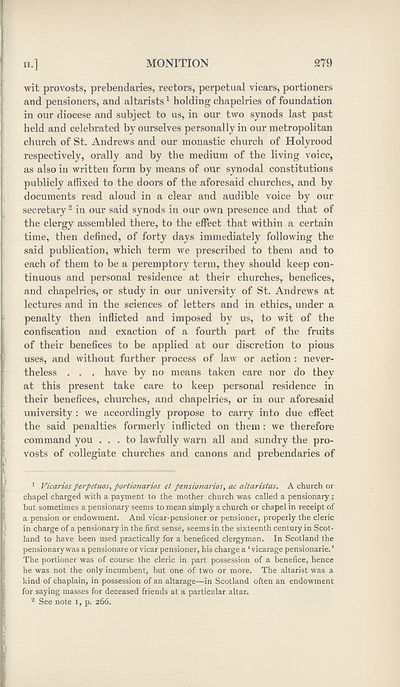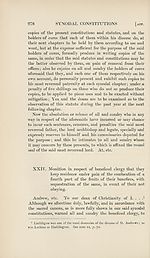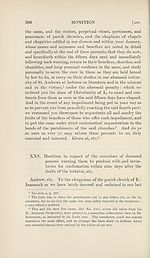Series 1 > Statutes of the Scottish Church, 1225-1559
(400) Page 279
Download files
Complete book:
Individual page:
Thumbnail gallery: Grid view | List view

II.]
MONITION
279
wit provosts, prebendaries, rectors, perpetual vicars, portioners
and pensioners, and altarists1 holding chapelries of foundation
in our diocese and subject to us, in our two synods last past
held and celebrated by ourselves personally in our metropolitan
church of St. Andrews and our monastic church of Holyrood
respectively, orally and by the medium of the living voice,
as also in written form by means of our synodal constitutions
publicly affixed to the doors of the aforesaid churches, and by
documents read aloud in a clear and audible voice by our
secretary2 in our said synods in our own presence and that of
the clergy assembled there, to the effect that within a certain
time, then defined, of forty days immediately following the
said publication, which term we prescribed to them and to
each of them to be a peremptory term, they should keep con¬
tinuous and personal residence at their churches, benefices,
and chapelries, or study in our university of St. Andrews at
lectures and in the sciences of letters and in ethics, under a
penalty then inflicted and imposed by us, to wit of the
confiscation and exaction of a fourth part of the fruits
of their benefices to be applied at our discretion to pious
uses, and without further process of law or action : never¬
theless . . . have by no means taken care nor do they
at this present take care to keep personal residence in
their benefices, churches, and chapelries, or in our aforesaid
university: we accordingly propose to carry into due effect
the said penalties formerly inflicted on them : we therefore
command you ... to lawfully warn all and sundry the pro¬
vosts of collegiate churches and canons and prebendaries of
1 Vicarios perpetuos, portionarios et pensionaries, ac altaristas. A church or
chapel charged with a payment to the mother church was called a pensionary;
but sometimes a pensionary seems to mean simply a church or chapel in receipt of
a pension or endowment. And vicar-pensioner or pensioner, properly the cleric
in charge of a pensionary in the first sense, seems in the sixteenth century in Scot¬
land to have been used practically for a beneficed clergyman. In Scotland the
pensionary was a pensionare or vicar pensioner, his charge a ‘ vicarage pensionarie. ’
The portioner was of course the cleric in part possession of a benefice, hence
he was not the only incumbent, but one of two or more. The altarist was a
kind of chaplain, in possession of an altarage—in Scotland often an endowment
for saying masses for deceased friends at a particular altar.
2 See note i, p. 266.
MONITION
279
wit provosts, prebendaries, rectors, perpetual vicars, portioners
and pensioners, and altarists1 holding chapelries of foundation
in our diocese and subject to us, in our two synods last past
held and celebrated by ourselves personally in our metropolitan
church of St. Andrews and our monastic church of Holyrood
respectively, orally and by the medium of the living voice,
as also in written form by means of our synodal constitutions
publicly affixed to the doors of the aforesaid churches, and by
documents read aloud in a clear and audible voice by our
secretary2 in our said synods in our own presence and that of
the clergy assembled there, to the effect that within a certain
time, then defined, of forty days immediately following the
said publication, which term we prescribed to them and to
each of them to be a peremptory term, they should keep con¬
tinuous and personal residence at their churches, benefices,
and chapelries, or study in our university of St. Andrews at
lectures and in the sciences of letters and in ethics, under a
penalty then inflicted and imposed by us, to wit of the
confiscation and exaction of a fourth part of the fruits
of their benefices to be applied at our discretion to pious
uses, and without further process of law or action : never¬
theless . . . have by no means taken care nor do they
at this present take care to keep personal residence in
their benefices, churches, and chapelries, or in our aforesaid
university: we accordingly propose to carry into due effect
the said penalties formerly inflicted on them : we therefore
command you ... to lawfully warn all and sundry the pro¬
vosts of collegiate churches and canons and prebendaries of
1 Vicarios perpetuos, portionarios et pensionaries, ac altaristas. A church or
chapel charged with a payment to the mother church was called a pensionary;
but sometimes a pensionary seems to mean simply a church or chapel in receipt of
a pension or endowment. And vicar-pensioner or pensioner, properly the cleric
in charge of a pensionary in the first sense, seems in the sixteenth century in Scot¬
land to have been used practically for a beneficed clergyman. In Scotland the
pensionary was a pensionare or vicar pensioner, his charge a ‘ vicarage pensionarie. ’
The portioner was of course the cleric in part possession of a benefice, hence
he was not the only incumbent, but one of two or more. The altarist was a
kind of chaplain, in possession of an altarage—in Scotland often an endowment
for saying masses for deceased friends at a particular altar.
2 See note i, p. 266.
Set display mode to:
![]() Universal Viewer |
Universal Viewer | ![]() Mirador |
Large image | Transcription
Mirador |
Large image | Transcription
Images and transcriptions on this page, including medium image downloads, may be used under the Creative Commons Attribution 4.0 International Licence unless otherwise stated. ![]()
| Scottish History Society volumes > Series 1 > Statutes of the Scottish Church, 1225-1559 > (400) Page 279 |
|---|
| Permanent URL | https://digital.nls.uk/126921786 |
|---|
| Attribution and copyright: |
|
|---|
| Description | Over 180 volumes, published by the Scottish History Society, containing original sources on Scotland's history and people. With a wide range of subjects, the books collectively cover all periods from the 12th to 20th centuries, and reflect changing trends in Scottish history. Sources are accompanied by scholarly interpretation, references and bibliographies. Volumes are usually published annually, and more digitised volumes will be added as they become available. |
|---|


